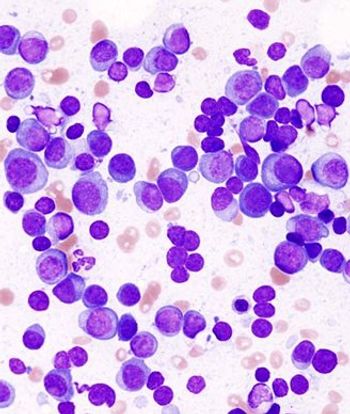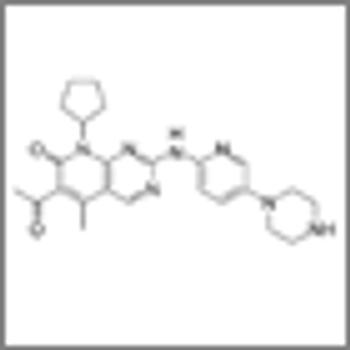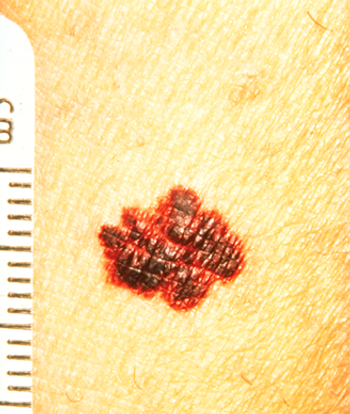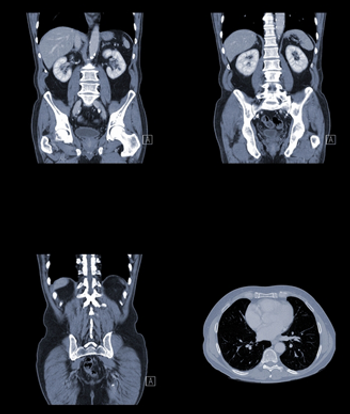
Colorectal tumors that lacked the ability to repair DNA were found to be highly responsive to checkpoint blockade with the anti–PD-1 drug pembrolizumab.

Your AI-Trained Oncology Knowledge Connection!


Colorectal tumors that lacked the ability to repair DNA were found to be highly responsive to checkpoint blockade with the anti–PD-1 drug pembrolizumab.

Researchers have identified several key diagnostic criteria for the diagnosis of melanoma and basal cell carcinoma with reflectance confocal microscopy.

A phase III trial found that primary chemotherapy resulted in similar survival compared with primary surgery in newly diagnosed advanced ovarian cancer patients.

Researchers have shown for the first time that an oncolytic immunotherapy can have therapeutic benefit in patients with advanced melanoma.

The CONCUR trial found that regorafenib improved overall survival in a large group of Asian patients with treatment-refractory metastatic colorectal cancer.

Preoperative albumin level and number of extended cytoreductive procedures in ovarian cancer patients predicted the likelihood of surgical complications.

Patients with acute myeloid leukemia who had a DNMT3A mutation had poorer disease prognosis, according to an analysis of patients aged 60 years or younger.

Presentation with a urinary tract infection delayed a bladder cancer diagnosis among a population of Medicare patients, with worse delays experienced by women.

Women who were treated for Hodgkin lymphoma during childhood and adolescence had similar rates of post-treatment parenthood as that of the general population.

TAS-102, an oral combination of trifluridine and tipiracil hydrochloride, improved median overall survival in patients with refractory colorectal cancer.

Nicotinamide, a form of vitamin B3, reduced the incidence of non-melanoma skin cancers among a group of high-risk patients, according to the ONTRAC study.

The addition of elotuzumab to lenalidomide and dexamethasone improved progression-free survival and overall response rate in relapsed multiple myeloma patients.

Use of an ovarian cancer risk algorithm that incorporated serum CA-125 screening was able to double the number of invasive epithelial ovarian cancers detected.

Survival for women with ovarian cancer has improved since 1975, according to the results of a recent study.

Older adults with acute myeloid leukemia have a substantial health care burden and high rates of health care utilization even at the end of life.

A revised International Pediatric Non-Hodgkin Lymphoma Staging System (IPNHLSS) could allow for more precise staging for children and adolescents with NHL.

The FDA has approved ramucirumab, a human VEGFR2 antagonist in combination with FOLFIRI for second-line treatment of patients with metastatic colorectal cancer.

MM-302 showed encouraging efficacy results and a manageable safety profile in heavily pretreated HER2-positive metastatic breast cancer patients.

For patients with advanced follicular lymphoma, a treatment strategy of rituximab induction was the most cost-effective approach compared with watch and wait.

Pfizer announced that the phase III trial of palbociclib was stopped early after meeting its primary endpoint of improved progression-free survival in women with HR–positive, HER2-negative metastatic breast cancer.

Patients with early-stage Hodgkin lymphoma who have a negative PET finding after 3 cycles of chemotherapy have a good prognosis without undergoing radiotherapy.

Treatment with nivolumab and ipilimumab in patients with advanced melanoma produced significantly higher rates of response and progression-free survival compared with ipilimumab alone.

Treatment with pembrolizumab resulted in an estimated 6-month PFS rate that was almost double that of treatment with ipilimumab in advanced melanoma patients.

Researchers have found immunologic evidence that simian virus 40 (SV40) may be associated with non-Hodgkin lymphoma (NHL).

Metastatic colorectal cancer patients had about a 1.5-month increase in overall survival when treated with second-line ramucirumab plus FOLFIRI vs FOLFIRI alone.

In a recently published study, patients who did not respond to initial radiation or re-irradiation of symptomatic bone metastases had significantly higher urinary markers of bone turnover at baseline and follow-up.

A recent retrospective study elucidates the correlation between breast cancer subtype and metastasis site, time to relapse, and patient survival.

Researchers have used observational study data to better define risks for breast and ovarian cancers associated with mutations in the BRCA1 or BRCA2 genes.

Low levels of vitamin D may be associated with poor survival in patients with follicular lymphoma, according to the results of a new analysis.

Use of routine follow-up imaging to monitor asymptomatic diffuse large B-cell lymphoma patients resulted in a small survival benefit, but at a substantial cost.